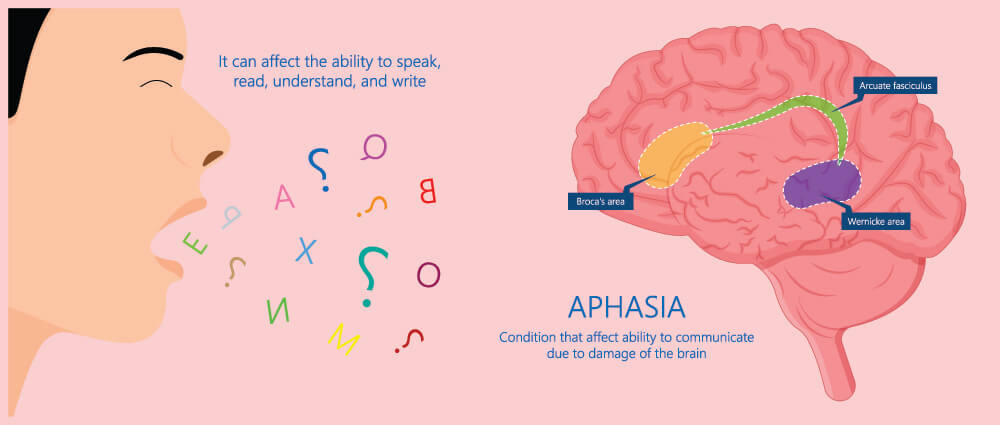Definition
An expressive aphasia definition was first described by Pierre Broca in 1861 and is, therefore, often called Broca’s aphasia. Difficulty in communicating written or spoken words can be mild (dysphasia) to severe (aphasia). Damage to the dominant side of the language centers in the cerebral cortex – in this case to Broca’s area in the dominant frontal lobe of the brain – is the primary cause of expressive aphasia. Most damage is the result of a stroke. Someone suffering from expressive aphasia knows exactly what they want to say but cannot find and produce the correct words.
What is Expressive Aphasia?
Expressive aphasia is a form of non-fluent aphasia that affects speech spontaneity. The speaker understands conversation and can produce the correct sentences in the brain but these words become lost between Broca’s area and other brain structures to which it is connected. These structures include the rest of the frontal lobe and the basal ganglia, cerebellum, and opposite brain hemisphere.
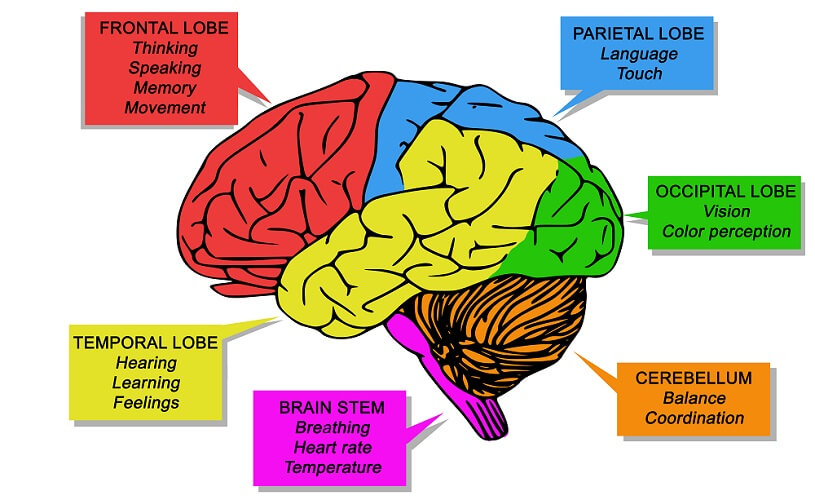
Broca’s Area
Broca’s area is a specific region in the frontal lobe. Which brain hemisphere this area lies in depends on which side is dominant for communication. Most right-handed people have left-hemisphere dominance in terms of language function as opposed to approximately 60% of left-handed people.
We still do not know enough about Broca’s area to develop an effective expressive aphasia treatment. This part of the frontal lobe is essential to speech production but exactly how signals pass through the brain is still much of a mystery. New diagnostic technologies in the form of brain surface readings are slowly unraveling these pathways. One technique is electrocorticographic (ECoG) recordings that use implanted electrodes on the brain surface to map out responsive areas.
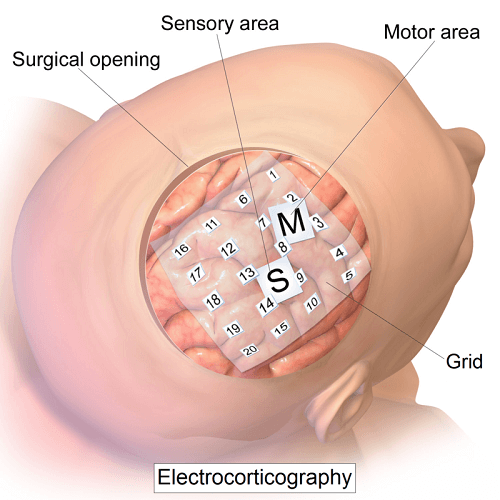
It is now known that Broca’s area is stimulated by sensory associations with particular words; it interacts with motor areas to produce gestures. However, Broca to motor area response has not yet been linked to articulation – the formation of words by the mouth.
Finding the right words to express one’s responses during communication is regulated by Broca’s area. Many theories exist as to how this regulation occurs.
Preliminary EcoG shows that when people hear words and are asked to repeat them, neuron activity moves from the auditory cortex within the dominant temporal lobe to Broca’s area. Activity then moves to the premotor and motor cortex during word articulation. This all occurs within just over one-third of a second.
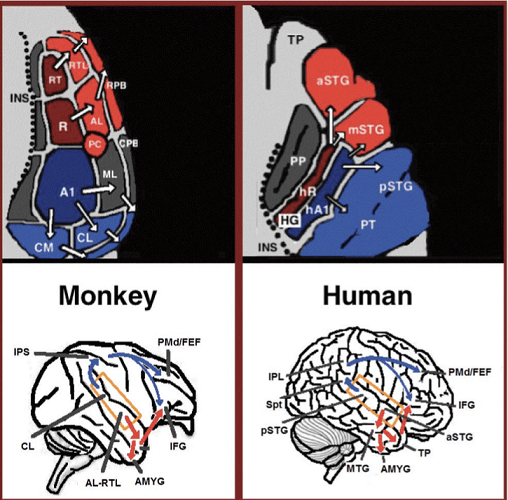
However, Broca’s activity has ended by the time a test subject has repeated the selected word. This corresponds with expressive aphasia processes that are not the result of articulation but happen before articulation occurs. In short, Broca’s area provides an auditory code that is processed further down the line by the motor cortices; expressive aphasia relates to problems with the formation of this code.
Expressive Aphasia vs Receptive Aphasia
There are many forms of aphasia; when comparing expressive aphasia versus receptive aphasia it is best to have basic knowledge of all variations.
The National Aphasia Association lists eight principal types of aphasia. The first division between these eight types is that which categorizes them according to the ability to speak fluently or non-fluently. These two subsets are further divided according to whether a person can understand a spoken or written message or not. And of these subsets, the final eight diagnoses are established based upon whether a person can repeat spoken words or not.
Aphasia can also affect one’s ability to write and draw. Below is an image produced by an aphasia patient when asked to draw an elephant.
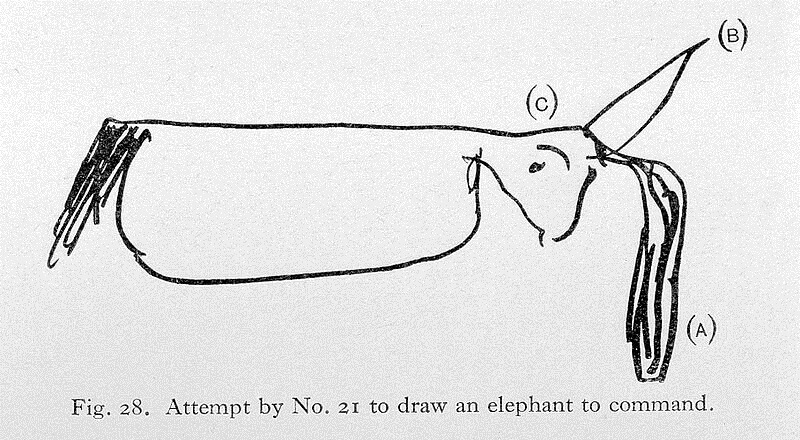
Global Aphasia
A person with global aphasia cannot speak fluently, does not comprehend what is said, and cannot repeat words. They also cannot read or write. This is the most severe form of aphasia and is commonly the result of extensive brain damage.
Mixed Transcortical Aphasia
When a person can repeat words but does not understand them and cannot speak with fluency, that person most probably suffers from mixed transcortical aphasia. Symptoms are often confused with expressive aphasia; however, the latter can comprehend speech.
Expressive Aphasia
Expressive, non-fluent aphasia does not affect language comprehension. Non-fluent refers to the halting, short, and often incorrect grammar and sentence formation sufferers present with.

Transcortical Motor Aphasia
A person with transcortical motor aphasia can understand what is said and can usually repeat complex phrases without much difficulty. Their own words, however, are short and fragmentary. This is because they find it hard to retrieve the correct word and so hold a conversation.
Wernicke’s Aphasia
Wernicke’s aphasia is another name for receptive aphasia. This is a form of fluent aphasia where the problem lies in language comprehension. Someone with receptive aphasia also cannot repeat words correctly. Strange word combinations and disconnected speech are the principal symptoms.
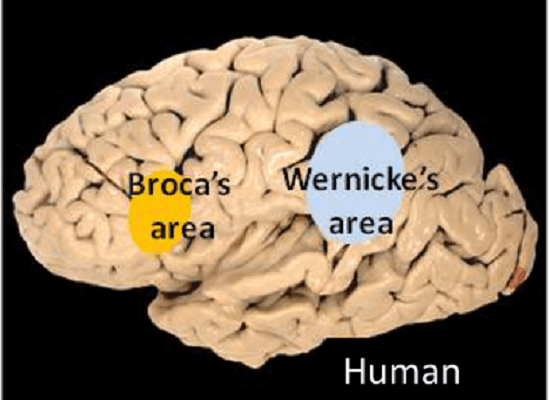
Transcortical Sensory Aphasia
Transcortical sensory aphasia allows both repetition and fluent speech but a significant lack of comprehension. A person can utter long, flowing sentences but these are interspersed with incorrect words. This makes what they say difficult for others to understand.
Conduction Aphasia
If a person can speak fluently and comprehend what is said to them but is unable to repeat words, they are presenting with symptoms of conduction aphasia or associative aphasia. Unlike many other forms, people with associative aphasia have no trouble reading and writing; however, when asked to repeat a word or a phrase, this is either difficult or impossible.

Anomic Aphasia
Anomic aphasia is the least life-changing form of aphasia and all of us have suffered from a short bout of non-pathological anomic aphasia at some time, although this is not due to brain damage. Anomic aphasia refers to the inability to remember a word – especially nouns and verbs – following damage to language areas of the brain.
Differences Between Receptive and Expressive Aphasia
If you type expressive and receptive aphasia in the search bar of a video-based platform such as YouTube, you can source countless examples. One of the most popular contributors is Sarah Scott who posted several videos to show her struggles with expressive aphasia after suffering from a stroke at just eighteen years of age.
The terms receptive and expressive also give clues about the differences between these aphasia types. An expressive language disorder relates to someone who has difficulty getting a point across. As we have already seen that gesture association is linked to Broca’s area (and so to expressive aphasia), we can conclude that the word-association stage of speech is central.
A receptive language disorder, on the other hand, is linked to difficulty receiving, understanding, and retaining information. Receptive aphasia can have numerous causes, while expressive aphasia is usually the result of damage to Broca’s area. Causes of receptive aphasia can be impaired hearing or even attention deficit disorders. If you have trouble understanding what people are saying when they are wearing a face mask (you cannot match facial expression to spoken words), you can understand what it is like to suffer from a mild form of receptive language disorder.

A short conversation with someone with expressive aphasia might go as follows:
“Hello.”
“Hello, Restaurant X, how can I help you?”
“Book … umm, table … tonight.”
“You would like to book a table for tonight? For how many people?”
“Errr…book … table person person person … three.” (A table for three)
The same conversation with someone with a less severe form of receptive aphasia would sound like this:
“Hello”
“Hello, Restaurant X, how can I help you?”
“I would like to book a trabacal for tonight.” (The person thinks he/she is saying table)
“A trabacal? You must mean a table. For tonight? For how many people?”
“For tree pancrabbles, please, at about seven o’clock.” (The person thinks he/she is saying three people)
Expressive Aphasia Causes
The most common cause of any form of aphasia is a cerebrovascular accident – the medical term for a stroke. In a stroke, the blood supply to the brain is either partially or completely blocked, or blood flow is reduced when a blood vessel ruptures.

Any part of the brain that depends on the blocked or ruptured vessel fails to receive sufficient oxygen or nutrients; brain function in this region is impaired. A slight blockage or rupture of a smaller vessel causes minor, localized symptoms; a complete blockage or the rupture of a major vessel can cause severe, widespread, and permanent damage. It has been reported that around one in every 272 Americans deals with a form of aphasia, most of these cases following a cerebrovascular accident.
Expressive aphasia causes are commonly stroke-related but specific to Broca’s area. If blood supply is affected in the dominant frontal lobe, this area cannot function properly. Damage to Broca’s area leads to word-association problems. Other expressive aphasia causes are hereditary- and age-related neurodegenerative diseases such as Alzheimer’s, as well as brain tumors and head trauma.

It is possible to induce temporary expressive aphasia by way of benzodiazepine drugs. This condition is sometimes picked up in the recovery room after a patient has undergone surgery; if the anesthetist administered the benzodiazepine known as midazolam hydrochloride, a reversible form of expressive aphasia could be the result. The risk of post-surgical, drug-induced expressive aphasia is very low.
The ICD-10 code for expressive aphasia is R47.01; however, the tenth edition of the International Classification of Diseases (ICD) does not list this form as a separate diagnosis. Instead, it groups all aphasia types together. Milder forms of ICD 10 (expressive) aphasia are given the code R47.02; mild aphasia is referred to as dysphasia, indicating that one’s ability to communicate is only mildly hindered.

Expressive Aphasia Treatment
As stroke is the primary cause of expressive aphasia, immediate treatment in the form of blood vessel repair or dissolving or removing a blood clot is the first step. This surgical or radiological treatment is followed by revalidation. Damaged parts of the brain can often be retrained.
It is also important to offer psychological support to someone with Broca’s aphasia – the lost ability to communicate can be frustrating and even end a successful career. Social isolation is not uncommon.

As medical treatments are not yet sophisticated enough to repair the brain (especially in relatively unknown regions such as Broca’s area), treatments are similar across the board. They are also personalized to each patient’s capacities and goals.
The main expressive aphasia treatment is speech therapy, either helping retrain the damaged area of the brain or teach alternative means of communication. The use of melodic intonation is popular as it seems that most patients with non-fluent forms of aphasia can sing those words they find hard to say. Melodic Intonation Therapy (MIT) has become a near-standard form of expressive aphasia treatment.

The current standard treatment for any type of aphasia is speech therapy under the guidance of a trained therapist who understands the nuances between different aphasia types.
If you find yourself speaking to someone with aphasia, keep your questions simply worded and do not raise your voice; a clear, well-articulated, and simply-worded conversation is more than possible in the absence of severe comprehension.
Expressive aphasia sufferers can partially or completely recover lost communication skills, even if the cause is a cerebrovascular accident. Such recovery requires dedication, effort, and time. Degenerative forms of this disorder are unlikely to improve.
Bibliography
- Kljajevic V. (2012). Comprehension of Wh-Dependencies in Broca’s Aphasia. Newcastle, Cambridge Scholars Publishing.
- Raymer AM, Gonzalez Rothi LJ (Eds.). (2018). The Oxford Handbook of Aphasia and Language Disorders. New York, Oxford University Press.
- Le H, Lui MY. Aphasia. (Updated 2020 ). Treasure Island (FL), StatPearls Publishing. Retrieved from: https://www.ncbi.nlm.nih.gov/books/NBK559315/

